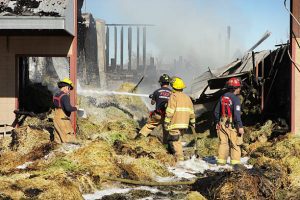Jobs in the fire service can be exciting.
From the moment the alarm goes off, the adrenaline rush is on.
Every call is different, so you’ll never know what to expect.
No matter what job you have, you’re saving lives at the end of the day.
In addition to helping others, there are even more reasons to pursue a job in the fire service.
1. Emergency Dispatcher

Why Become an Emergency Dispatcher?
Once 911 receives an emergency call, the call gets routed to the emergency dispatcher.
The emergency dispatcher determines which units to dispatch.
Therefore, an emergency dispatcher needs to be able to multitask, stay calm, and be empathetic.
To be an emergency dispatcher, you don’t need a college degree.
Also, you use customer service skills to help people.
Finally, you get to do all of this and get paid around $45,000 per year.
| Emergency Dispatcher Key Stats | |
|---|---|
| Avg. Salary / year | $54,800 |
| Avg. Pay / hour | $26.35 |
| Education | 0-1 Year |
| Job Outlook | 6% |
| Total Employed | 101,140 |
Read the full career guide: How to Become an Emergency Dispatcher
2. Fire Inspector

Why Become a Fire Inspector?
Fire inspectors help prevent fires by making sure that buildings comply with the fire code.
You can work at local, state, and federal levels.
Because of this, being a fire inspector is a step-up from being a firefighter.
Therefore, more education and training are required, usually including a bachelor’s degree.
More training means more salary, which is usually about $67,000.
In addition, you need strong communication skills.
| Fire Inspector Key Stats | |
|---|---|
| Avg. Salary / year | $87,440 |
| Avg. Pay / hour | $42.04 |
| Education | 3-4 Years |
| Job Outlook | 24% |
| Total Employed | 14,050 |
Read the full career guide: How to Become a Fire Inspector
3. Firefighter

Why Become a Firefighter?
While most firefighters sign up because they want to serve, being a firefighter offers additional perks.
For example, the average annual salary for a firefighter is $52,500.
Also, firefighters work a flexible schedule. This allows you to do other things, like a second job, time with your family, or continue your education.
Moreover, there are opportunities for career advancement upwards and laterally.
Most of all, firefighting provides you with a skilled team that thrives on team spirit.
| Firefighter Key Stats | |
|---|---|
| Avg. Salary / year | $63,890 |
| Avg. Pay / hour | $30.72 |
| Education | 2-4 Years |
| Job Outlook | 7.2% |
| Total Employed | 332,240 |
Read the full career guide: How to Become a Firefighter
4. Pyrotechnician

Why Become a Pyrotechnician?
As a pyrotechnician, you set up and discharge fireworks.
Being a pyrotechnician is more than just blowing things up.
You need artistry.
You create a show that amazes viewers.
Along with creativity, you also have to possess intelligence because you have to obey the laws regulating fireworks.
This requires training, experience, and, most often, a license.
It doesn’t require a college degree.
Most pyrotechnicians work as independent contractors and make, on average, $52,000 per year.
| Pyrotechnician Key Stats | |
|---|---|
| Avg. Salary / year | $63,890 |
| Avg. Pay / hour | $30.72 |
| Education | 0-6 Months |
| Job Outlook | 6% |
| Total Employed | 332,240 |
Read the full career guide: How to Become a Pyrotechnician
5. Paramedic

Why Become a Paramedic?
Being a paramedic requires more training than being an EMT.
While EMTs can do basic CPR and first aid, paramedics perform more in-depth procedures.
Paramedics work the same schedule as a firefighter.
Plus, if you qualify, you can advance further into the field of medicine with additional education and certification.
As for pay, paramedics make more than EMTs at an average of $45,000 a year.
| Paramedic Key Stats | |
|---|---|
| Avg. Salary / year | $50,460 |
| Avg. Pay / hour | $24.26 |
| Education | 1-2 Years |
| Job Outlook | 7% |
| Total Employed | 277,520 |
Read the full career guide: How to Become a Paramedic
6. SWAT Team Member

Why Become a SWAT Team Member?
SWAT team members belong to a special police unit that responds to high-risk incidents.
They are the ones that respond to hostage situations.
It requires special training to be a SWAT Team Member.
Often, situations that involve SWAT may require firefighters, also.
On average, SWAT team members make about $67,000 annually.
| SWAT Team Member Key Stats | |
|---|---|
| Avg. Salary / year | $79,320 |
| Avg. Pay / hour | $38.14 |
| Education | 2-4 Years |
| Job Outlook | 5% |
| Total Employed | 666,990 |
Read the full career guide: How to Become a SWAT Team Member
7. EMT

Why Become an EMT?
First of all, some fire departments require basic firefighters to carry at least EMT certification.
On the other hand, you don’t have to be a firefighter to be an EMT.
Plenty of EMTs just rides the ambulance to a fire call.
Plus, just like paramedics, EMTs work the same schedule as firefighters.
Finally, EMTs get paid an average annual salary of $36,500.
| EMT Key Stats | |
|---|---|
| Avg. Salary / year | $50,460 |
| Avg. Pay / hour | $24.26 |
| Education | 0-1 Year |
| Job Outlook | 7% |
| Total Employed | 277,520 |
Read the full career guide: How to Become an EMT
8. Arson Investigator

Why Become an Arson Investigator?
First of all, some fire departments require basic firefighters to carry at least EMT certification.
On the other hand, you don’t have to be a firefighter to be an EMT.
Plenty of EMTs just rides the ambulance to a fire call.
Plus, just like paramedics, EMTs work the same schedule as firefighters.
Finally, EMTs get paid an average annual salary of $36,500.
| Arson Investigator Key Stats | |
|---|---|
| Avg. Salary / year | $87,440 |
| Avg. Pay / hour | $42.04 |
| Education | 1-2 Years |
| Job Outlook | 6% |
| Total Employed | 14,050 |
Read the full career guide: How to Become an Arson Investigator
9. Conservationist

Why Become a Conservationist?
A conservationist specializes in protecting and preserving natural resources.
In the fire service, they work with firefighters to stop the spread of wildfires.
After the fire dies down, conservationists work to restore the land back to its natural state.
This may include replanting trees that were destroyed by wildfires.
Along with helping restore nature, conservations benefit from an annual salary of around $67,000.
| Conservationist Key Stats | |
|---|---|
| Avg. Salary / year | $74,310 |
| Avg. Pay / hour | $35.73 |
| Education | 4+ Years |
| Job Outlook | 6.3% |
| Total Employed | 25,590 |
Read the full career guide: How to Become a Conservationist










